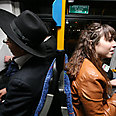
On secular hypocrisy
Op-ed: Seculars in Israel doing better job than haredim in concealing their exclusion of women
For years we have walked around with our chest swollen with pride, making an effort to use every opportunity to demonstrate how important women are to us and how terrible we find the offense caused to them. The haredim won't let them run for public positions, exclude their images from their newspapers and push them into a corner, into the women's section of the public space. So that they won't be seen, so that they won't be heard, so that their presence won't be felt.
We were so busy denouncing the haredim that we failed to notice what was taking place in our own shtetl. The wage gaps between men and women are huge – according to Central Bureau of Statistics figures, in 2012 a man's average salary was NIS 10,953 (about $3,125) and a woman's was NIS 7,244 ($2,070). A shocking gap of 33.9% which hasn't changed much for many years.
About half of women work in jobs defined by feminist movements as the "mud floor" – the six occupations perceived as traditional feminine occupations, which have low prestige and an inferior income, including teaching in elementary schools and kindergartens, nursing, secretarial jobs, etc. The women who strive for more discover the glass ceiling – in order to reach a high salary, the woman must climb a staircase reserved only for men who only allow men to climb it and create invisible barriers for women.
Zero presence among decision makers
We were so busy pointing at the haredim's attitude towards women that we failed to notice the atrocious underrepresentation of women in politics. Although women make up about half of Israel's population – only 14 served as ministers and 14 as deputy ministers in the different Israeli governments. More than four women have never served together in the same government. Today only 22.5% of Knesset members and 18% of ministers are women. These figures put Israel in the 64th place in the world in the representation of women in parliament and in the 20th place out of 34 OECD countries.
Ever since the implementation of direct elections in Israel's local authorities, only 14 women (magic number?) have been elected as head of a local authority. The percentage of women council members climbed slowly over the years from 4.2% in 1950 to 14% in 2013.
In the October 22 municipal elections the number of women running for the position of council member increased significantly, I was told by a senior Interior Ministry official. Twenty percent of candidates for council member were women. But although 330 women were elected – a 30% leap in the number of representatives compared to 2008, when only 250 were elected, the percentage of council members remained just 14% (magic number, remember?).
Forty-two women run for the position of council head, 6% of all candidates in 2013 and four times the number of women candidates in the 2008 elections. Unfortunately, we are left with a miserable number of five women serving as mayors – only about 2% of all heads of local authorities in Israel – in Netanya, Yehud, Ganei Tikva, Arad and the Bnei Shimon Regional Council.
These disgraceful numbers indicate that the presence of women in decision-making positions is low to zero. Many say that there is no need to push women into boards of directors and parties through legal means. On the contrary, the objectors say, there is a risk that we will push less talented women into these bodies just because we have to fill the table with female extras.
I disagree with this opinion. Only a legal revolution setting a quota of women in political and business bodies will lead to an increase in the presence of women in decision-making positions and succeed in creating an egalitarian reality. Projects training candidates for political leadership are an excellent tool as well for fighting underrepresentation, as we can see from the 83% increase in the number of female elected representatives in communities where the WePower association operates such a program.
It's easy and populist to point at the random haredi caught degrading a woman by preventing her from running for council, by pushing her to the back of the bus or by accusing her of being immodest. But we, as citizens who perceive themselves as enlightened, must know that people who live in glass houses shouldn’t throw stones and ask ourselves why the secular is permitted to do what the haredi isn't.
The results of the recent elections – only five women as council heads out of 251 local authorities – prove that the seculars are doing a better job than the haredim… in concealing their exclusion of women.
Ze'ev Yanay is a media consultant and CEO of Stern Ariely & Yanay










